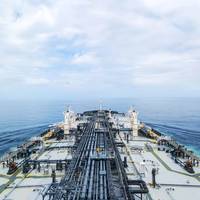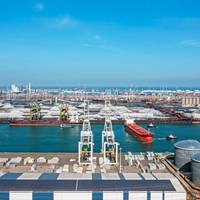Platts Launches Tanker Freight Rates to Reflect Costs of New Fuels

Platts, part of S&P Global Commodity Insights, has launched new price assessments for tanker base freight rates that factor in pricing for alternative fuels, the agency said on Tuesday.The move comes as the agency expects the maritime sector's use of alternative fuels, such as liquefied natural gas (LNG) to grow significantly in the next few years.With about 90% of world trade transported by sea, shipping accounts for nearly 3% of the world's CO2 emissions, yet environmental campaigners…
Rotterdam Port to Make New Metering System Compulsory for Ship Refueling

Rotterdam, Europe's biggest port, plans to make mass flow meters, which can measure fuel supplies more accurately, compulsory for ship refueling, a spokesperson for the port told Reuters on Thursday. The move aims to boost transparency and efficiency to avoid disputes over fuel volumes that sometimes occur during refueling, a process known as bunkering. Singapore, the world's largest bunkering hub, made mass flow meters compulsory for ship refueling in 2017 and is the only port to have done so until now.
LNG Bunkering Takes Off in Rotterdam
The throughput of LNG - liquefied natural gas - as bunker fuel in the Rotterdam bunker port increased considerably from 1,500 to 9,500 tonnes in 2018.Meanwhile, the sale of bunker oil - fuel for shipping - in the bunker port decreased from 9.9 million m3 to 9.5 million m3. The decrease can almost entirely be ascribed to the decline in sales of heavy fuel oil from 8.3 million m3 to 7.9 million m3.The Port of Rotterdam Authority suspects that the decline in bunker volumes in Europe’s largest bunker port is a consequence of the increased scale and use of modern vessels in container shipping. Supplies to container ships account for approximately 70 per cent of the total Rotterdam bunker market.These days, LNG bunkering in Rotterdam is business as usual.
Maersk, Vopak to Launch 2020 Fuel Bunkering in Rotterdam
A.P. Moller - Maersk and Royal Vopak, an independent tank storage operator active in the heart of Rotterdam’s bunker environment, have agreed to this first joint initiative which will cater for circa 20% of Maersk global demand, enabling A.P. Moller - Maersk to deliver approximately 2.3mt per year.As an anchor tenant in the modified facilities this agreement will enable Maersk, as well as any other interested third parties, to supply vessels trading with and inside Europe with compliant fuel. “We trust that this initiative will put to rest some of the concerns the industry has on fuel availability as well as secure our continued competitiveness in the market,” says Niels Henrik Lindegaard, Head of Maersk Oil Trading, a division of A.P.
Fewer Bunkers in Rotterdam in 2016
In 2016 the sale of bunker oil - fuel for shipping - in the Rotterdam bunker port diminished from 10.6 million m3 to 10.1 million m3. There is no reason known for this decline. For the first time, ships bunkered a sea-going vessel with LNG, liquefied natural gas, in Rotterdam. Every year, some 11 million m3 of bunker fuel is supplied to vessels in Rotterdam. In Rotterdam, every imaginable fuel can be obtained in huge quantities. The port of Rotterdam is Europe’s largest bunkering port, as well as one of the top three bunkering ports worldwide. Every year, some 11 million m3 of bunker fuel is supplied to vessels in Rotterdam. In Rotterdam, every imaginable fuel can be obtained in huge quantities: from HFO to bio fuels.
CMA CGM First-Quarter 2012 Financial Results
CMA CGM carried volume grew by 13.4% year-on-year to 2.6 million teus in the first quarter of 2012, while consolidated revenue increased by 2.6% to $3.6 billion during the period. The first quarter was particularly difficult for the maritime container shipping industry. In a market shaped by persistent overcapacity, freight rates fell to new lows during the period, while oil prices climbed sharply until mid-March, with Rotterdam bunker prices rising to nearly $720 per ton. In response to these challenging market conditions, CMA CGM continued to implement its cost reduction plan, which delivered $96.5 million in savings over the quarter, above initial target.
Rotterdam Bunker Biz up in 2004
11.4 million tons was bunkered in Rotterdam in 2003, as compared to 10.6 million tons in the previous year. The 7.4 percent increase meant a record for the port in terms of the amount of ship's fuels and lubricants supplied to the seagoing shipping sector. With a turnover of roughly $2 billion and direct employment for well in advance of 1400 people, it was a particularly good year for the bunker sector. Following Singapore, Rotterdam is the largest bunker port in the world. In 2003, 20,676 bunker operations were carried out: an average of 57 per day. Captain Cornelius de Keijzer, bunker expert of the Port of Rotterdam, was pleased with the results.
Petroval Enters Rotterdam Market
In line with its strategic plan to get closer to certain end user markets, Geneva based Petroval has concluded a long term contract for storage of fuel oil with Vopak at their Europoort site, commencing in the second quarter of 2004. Petroval will break bulk and re-deliver products, which are refined at Russian refineries as well as in Lithuania, directly into the Rotterdam bunker market. Petroval is an oil trading company specializing in the marketing and sales of crude oil and refined oil products originating mainly from the Russian Federation. The company through commercial contracts handles most of the international exports of products refined by Yukos Oil Company.
AFT-Chemoil’s New Barge Christened
AFT-Chemoil’s newest barge, the Amalia, was named in Rotterdam on December 9th.The Amalia will immediately go into operation alongside the Maxima which started service in 2003. Both barges are jointly owned by AFT-Chemoil and Rotterdam barge operator FTS-Hofftrans. The Amalia has a capacity of 4,200 mts while the Maxima’s capacity is 6,745mts. In combination the two barges provide AFT-Chemoil a significant strength in the Rotterdam bunker market. Both barges are ideally suited to the requirements of today’s newest containerships for larger volumes and faster pumping rates. Using the two barges together AFT-Chemoil can now deliver through one hose connection quantities in excess of 10,000 mts at rates exceeding 1,000 mts per hour.







